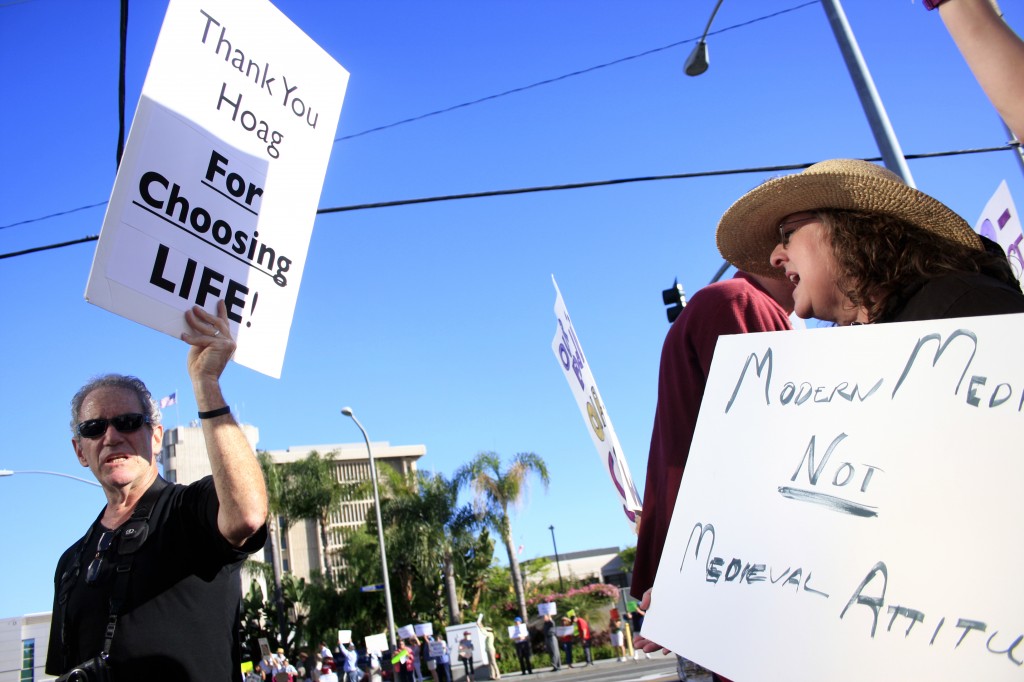Hoag Memorial Hospital Presbyterian and the California Attorney General’s office have come to an agreement regarding a controversial issue concerning women’s health that began about a year ago.
The hospital may continue to ban elective abortions, an action it took last May after merging with St. Joseph Health System, as long as it also provides information and resources so women can have the procedure elsewhere. The alternatives must be in Hoag’s service area, which includes 45 zip codes.
“We fully support these clarifications of the original conditions which align with our mission of providing the highest quality health care to the communities we serve, as we have for more than 60 years,” said Hoag President and CEO Robert Braithwaite in a statement.

— Photo by Sara Hall
Last year, the ban drew criticisms from pro-choice supporters, women’s health advocates and Hoag doctors. Several hundred people demonstrated outside of Hoag, both in support and in protest, following the ban.
“OC Women’s Coalition brought hundreds of women from ten different organizations together to fight for a responsible solution at Hoag and we succeeded,” said Suzanne Savary, past president of the Newport Beach Women’s Democratic Club and part of the OC Women’s Coalition, the group behind the Hoag protest and much of the criticism and fight against the ban.
The agreement, which Braithwaite and supervising deputy attorney general Mark Beckington signed in late March, states that it would best serve the public to clarify certain terms and for Hoag to provide some additional assurances and benefits to the community to address concerns.
In February 2013, Attorney General Kamala Harris issued a “conditional consent” approval for the affiliation between Hoag and the Catholic healthcare system.
The investigation into the affiliation was opened “in response to concerns raised by members of the public, physicians affiliated with Hoag, and others related to the compliance with Condition VI of the Consent, the effects of the affiliation on the continued provision of women’s health services by Hoag, and representations made by Hoag with respect thereto,” the agreement explains.
Hoag agreed to extend the requirements of condition VI, providing the same level of women’s health services as it did prior to the affiliation, for an additional 10 years on top of the previously agreed upon 10 year period.
The services would include tubal litigations and contraceptives but not “direct abortions.”
The term “direct abortion” was also clarified in the agreement to be defined as “the directly intended termination of pregnancy before viability (24-26 weeks gestation).”
“Miscarriages, ectopic pregnancies and emergency services for women experiencing complications related to pregnancy termination at outside facilities, are not direct abortion,” the agreement continues.
During those 20 years Hoag must, among other things, maintain information on their website about the availability of abortion and family planning services at other facilities in Orange County, am informed referral program for patients, a physician resource guide on its medical staff intranet site, and that will not be bound by the ethical and religious directives for Catholic Health Care Services, which St. Joseph follows.
“We know our community will reap significant benefits from this affiliation,” Braithwaite said. “There is already enthusiastic collaboration between Hoag and St. Joseph Health that is producing meaningful benefits and will certainly improve upon the high quality health care available today in our region. We’re excited to continue these efforts in a way that solves some of today’s health care challenges and mitigates those we see in the future.”




